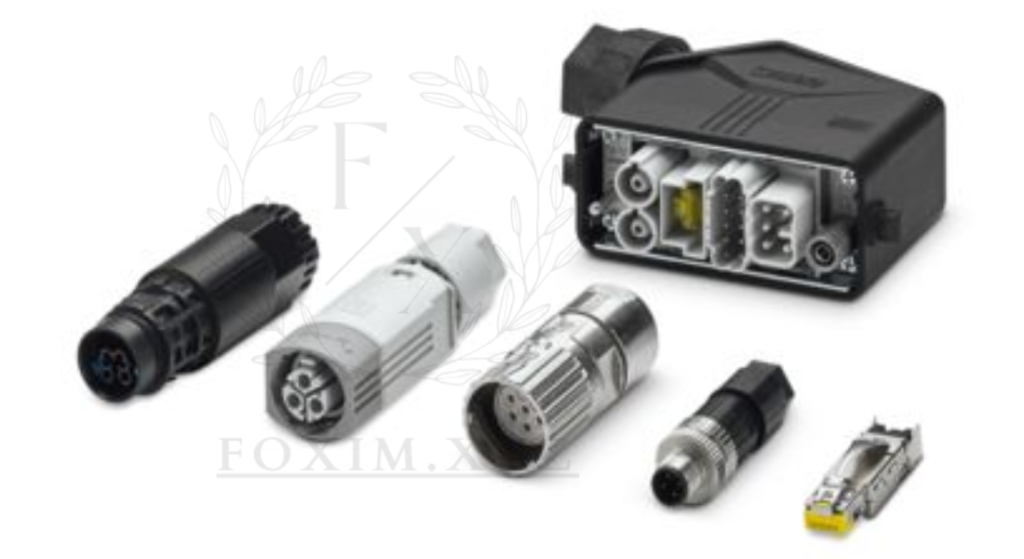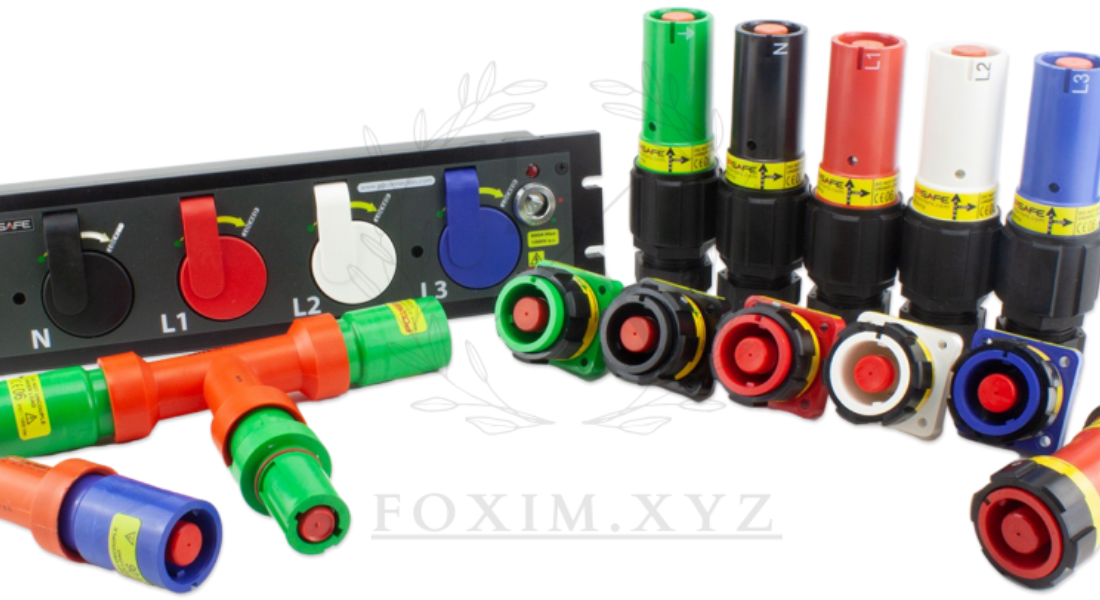In today’s rapidly evolving industrial landscape, the role of reliable and efficient power connectors cannot be overstated. Industrial power connectors are vital components that ensure safe, consistent, and efficient power transmission in various industries, from manufacturing to telecommunications and beyond. These connectors are designed to handle the most demanding environments, providing seamless connectivity for machines, equipment, and systems. Whether it’s for heavy machinery, control panels, or complex automation systems, understanding the different types of industrial power connectors and their applications is crucial for ensuring both performance and safety.
This comprehensive guide will take you through everything you need to know about industrial power connectors—from their types and features to their applications and benefits—helping you make an informed decision when choosing the right connectors for your business.
What Are Industrial Power Connectors?
Industrial power connectors are specialized electrical connectors designed to handle higher voltages and currents, ensuring safe and reliable power distribution in industrial environments. These connectors are typically used to connect power sources to machinery, equipment, and infrastructure, and they come in various shapes, sizes, and configurations depending on the application.
In industrial settings, power connectors must be durable, rugged, and capable of withstanding harsh conditions such as extreme temperatures, moisture, dust, and vibrations. These features are essential for ensuring the longevity and safe operation of critical systems, making industrial power connectors an indispensable part of modern industry.
Types of Industrial Power Connectors
Industrial power connectors come in many different forms, each designed to meet specific application needs. Understanding the different types will help you select the right connector for your project. Below are the most common types of industrial power connectors:
1. Circular Power Connectors
Circular connectors are among the most commonly used in industrial applications. They are designed for both power and signal transmission and are available in a variety of sizes and configurations. These connectors typically have a circular shape and are often used in rugged environments where space is limited or for outdoor applications where durability and weather resistance are important.
Circular industrial power connectors can feature different pin configurations (male or female), and they offer a high level of protection against moisture and dust (IP-rated). This makes them suitable for a wide range of industrial equipment, including robotics, automation systems, and control panels.
2. Rectangular Power Connectors
Rectangular connectors are commonly used in applications that require high power and signal integrity, especially in environments where space efficiency is important. These connectors are available in both high-density and low-density configurations and can support a wide range of current ratings. Industrial power connectors in this category are typically used in power distribution systems, machine tools, and industrial control systems.
One of the key advantages of rectangular connectors is their ability to provide greater power handling capacity while maintaining compact designs.
3. Heavy-Duty Power Connectors
Heavy-duty power connectors are designed for industrial applications that demand a higher level of power transmission, typically in environments that involve machinery, automation, and manufacturing. These connectors are known for their robustness and ability to handle large currents and high voltages. They are commonly used in industries such as automotive, construction, and oil and gas, where the need for durable and reliable power connections is critical.
These industrial power connectors are typically rated for higher amperage and can withstand severe mechanical stresses, temperature fluctuations, and exposure to chemicals or other industrial contaminants. Their applications range from power generation to large-scale manufacturing equipment.
4. Modular Power Connectors
Modular power connectors are designed to be customizable to fit a wide variety of applications. They consist of interchangeable components that allow engineers to configure connectors to meet specific needs. These connectors are used in complex systems that require flexibility, scalability, and adaptability.
Industrial modular power connectors can be found in a range of industries such as telecom, transportation, and renewable energy. Their modular design allows for easy maintenance, upgrades, and customization as requirements change over time.
5. Push-Pull Power Connectors
Push-pull connectors offer a secure, quick, and easy connection method. These industrial power connectors are designed to prevent accidental disconnections and ensure that the connector is fully engaged. Push-pull connectors are typically used in applications where connectors need to be locked into place for safety or to avoid interruptions in power distribution.
They are commonly used in applications like industrial automation, medical devices, and transportation systems, where secure power connections are critical to the system’s integrity.
Features of Industrial Power Connectors
Industrial power connectors are specifically designed to meet the demands of harsh industrial environments. Here are some of the key features that make these connectors stand out:
1. High Durability
Industrial environments expose connectors to challenging conditions such as high temperatures, moisture, dust, and mechanical vibrations. Industrial power connectors are designed to be rugged and withstand these harsh conditions. Many connectors feature metal housings, heavy-duty seals, and high-quality materials to protect against wear and tear.
2. High Voltage and Current Ratings
These connectors are engineered to handle high voltage and current loads safely. Industrial power connectors typically have high power ratings, ensuring they can supply power to large machinery and equipment without risking overheating or failure.
3. Safety Features
Safety is a top priority in industrial environments, and many industrial power connectors come equipped with locking mechanisms or safety clips to ensure a secure connection. Some connectors also have built-in features to prevent short circuits, reverse polarity, and overloading, enhancing the overall safety of industrial operations.
4. Corrosion Resistance
Many industrial power connectors are designed with materials that resist corrosion and degradation caused by environmental factors. Connectors made from stainless steel, brass, or coated metals are commonly used to ensure long-lasting performance in environments with exposure to moisture, chemicals, or saltwater.
5. Ease of Maintenance
Many industrial power connectors are designed for easy maintenance and quick replacements. Some have modular designs that allow individual components to be replaced without needing to replace the entire connector. This ensures minimal downtime and reduces maintenance costs.
Benefits of Industrial Power Connectors
Using the right industrial power connectors offers several benefits, including:
1. Reliability
By providing secure and stable connections, industrial power connectors ensure that your equipment operates without interruptions, preventing costly downtime and increasing productivity. Reliable power connections are essential in industrial environments where equipment failure can result in major operational losses.
2. Enhanced Efficiency
Using high-quality connectors can significantly improve the efficiency of power distribution systems, reducing energy losses and optimizing power flow to machinery and equipment. With the right connectors in place, systems can operate at peak performance, resulting in better energy utilization.
3. Cost Savings
While industrial power connectors might have a higher upfront cost compared to generic connectors, their durability, efficiency, and reduced maintenance requirements lead to significant cost savings over time. These connectors minimize the risk of power failures, accidents, and costly repairs.

4. Flexibility
With a wide variety of options available, industrial power connectors can be tailored to meet the specific needs of different applications. Whether you need a connector that can handle high voltages, one that is resistant to harsh chemicals, or one that offers quick-connect features, there is a solution for every requirement.
5. Improved Safety
Industrial power connectors are engineered to ensure safety, with many featuring locking mechanisms, strain relief features, and protective housing. These safety features reduce the risk of electrical hazards such as short circuits, overheating, and accidental disconnections, keeping workers and equipment safe.
How to Choose the Right Industrial Power Connector
Choosing the right industrial power connector is essential to ensuring the success of your application. Here are some factors to consider when selecting the perfect connector:
1. Current and Voltage Ratings
Always choose a connector that can handle the current and voltage requirements of your application. Overloading connectors can lead to overheating, short circuits, and system failures.
2. Environmental Conditions
Consider the environment in which the connector will be used. If the connector will be exposed to high temperatures, moisture, dust, or chemicals, make sure it is designed to withstand these conditions.
3. Size and Space
Evaluate the available space for the connector in your equipment. In tight spaces, smaller connectors or modular connectors may be more appropriate.
4. Locking Mechanism
If safety is a priority, consider connectors with locking mechanisms to prevent accidental disconnections, especially in mobile or vibrating systems.
5. Maintenance and Serviceability
Choose connectors that are easy to maintain and replace. Modular connectors or those with replaceable components can reduce downtime and simplify repairs.
Conclusion
Industrial power connectors play an integral role in the performance, reliability, and safety of modern industrial systems. By understanding the different types, features, and benefits of these connectors, you can make better-informed decisions that improve the efficiency of your power distribution and connectivity. Whether you’re working in automation, manufacturing, telecommunications, or another industrial sector, selecting the right power connectors is crucial to ensuring your systems run smoothly and safely.
With their durable construction, versatility, and high-performance capabilities, industrial power connectors are indispensable components in maintaining the integrity and functionality of industrial operations. Investing in quality connectors not only enhances your systems’ performance but also provides long-term benefits in terms of safety, cost savings, and operational efficiency.
